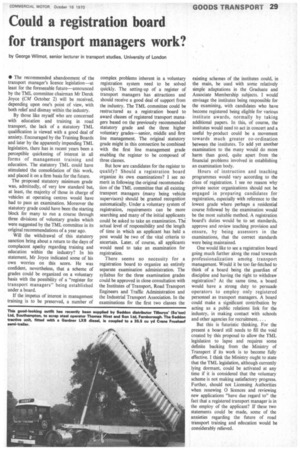Could a registration board for transport managers work?
Page 31

If you've noticed an error in this article please click here to report it so we can fix it.
by George Wilmot, senior lecturer in transport studies. University of London
• The recommended abandonment of the transport manager's licence legislation—at least for the foreseeable future—announced by the TML committee chairman Mr Derek Joyce (CM October 2) will be received, depending upon one's point of view, with both relief and dismay within the industry.
By those like myself who are concerned with education and training in road transport, the lack of a statutory TML qualification is viewed with a good deal of anxiety. Encouraged by the Training Boards and later by the apparently impending TML legislation, there has in recent years been a perceptible quickening of interest in all forms of management training and education. The statutory TML could have stimulated the consolidation of this work, and placed it on a firm basis for the future.
The proposed statutory minimum grade was, admittedly, of very low standard but, at least, the majority of those in charge of vehicles at operating centres would have had to pass an examination. Moreover the statutory grade could have been the starting block for many to run a course through three divisions of voluntary grades which were suggested by the TML committee in its original recommendations of a year ago.
Will the withdrawal of this statutory sanction bring about a return to the days of complacent apathy regarding training and education within the industry? In his statement, Mr Joyce indicated some of his own worries on this score. He was confident, nevertheless, that a scheme of grades could be organized on a voluntary basis with the possibility of a "register for transport managers" being established under a board.
If the impetus of interest in management training is to be preserved, a number of complex problems inherent in a voluntary registration system need to be solved quickly. The setting-up of a register of transport managers has attractions and should receive a good deal of support from the industry. The TML committee could be restructured as a registration board to award classes of registered transport managers based on the previously recommended statutory grade and the three higher voluntary grades—senior, middle and first line management. The original statutory grade might in this connection be combined with the first line management grade enabling the register to be composed of three classes.
But how are candidates for the register to qualify? Should a registration board organize its own examinations? I see no merit in following the original recommendation of the TML committee that all existing transport managers (many being vehicle supervisors) should be granted recognition automatically. Under a voluntary system of registration, requirements can be more searching and many of the initial applicants could be asked to take an examination. The actual level of responsibility and the length of time in which an applicant has held a post would be two of the vital criteria to ascertain. Later, of course, all applicants would need to take an examination for registration.
There seems no necessity for a registration board to organize an entirely separate examination administration. The syllabus for the three examination grades could be approved in close consultation with the Institutes of Transport, Road Transport Engineers and Traffic Administration and the Industrial Transport Association. In the examinations for the first two classes the existing schemes of the institutes could, in the main, be used with some relatively simple adaptations in the Graduate and Associate Membership subjects. I would envisage the institutes being responsible for the examining, with candidates who have become registered being eligible for various institute awards, normally by taking additional papers. In this, of course, the institutes would need to act in concert and a useful by-product could be a movement towards much greater co-ordination between the institutes. To add yet another examination to the many would do more harm than good, quite apart from the financial problems involved in establishing " an examination body.
Hours of instruction and teaching programmes would vary according to the class of registration. I see no reason why private sector organizations should not be engaged in preparing candidates for registration, especially with reference to the lowest grade where perhaps a residential course followed by the examination would be the most suitable method. A registration board's duties would be to set standards, approve and review teaching provision and ensure, by being assessors in the examinations, that the correct standards were being maintained.
One would like to see a registration board going much further along the road towards professionalization among transport management. Would it be too far-fetched to think of a board being the guardian of discipline and having the right to withdraw registration? At the same time, a board would have a strong duty to persuade operators to employ only registered personnel as transport managers. A board could make a significant contribution by acting as a public relations link for the industry, in making contact with schools and other agencies for recruitment....
But this is futuristic thinking. For the present a board still needs to fill the void created by this proposal to allow the TML legislation to lapse and requires some definite backing from the Ministry of Transport if its work is to become fully effective. I think the Ministry ought to state that the TML legislation, although currently lying dormant, could be activated at any time if it is considered that the voluntary scheme is not making satisfactory progress. Further, should not Licensing Authorities when renewing 0 licences and reviewing new applications "have due regard to" the fact that a registered transport manager is in the employ of the applicant? If these two statements could be made, some of the anxieties regarding the future of road transport training and education would be considerably relieved.
























































































































